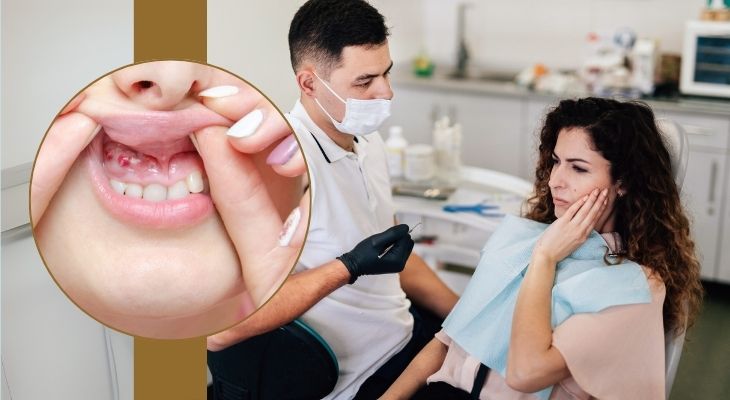
Pyorrhea Treatment in Delhi: Restore Your Gum Health
Gum disease can silently compromise your oral health, but you don’t have to let it take control. Pyorrhea(inflammation of gums) is a common yet often neglected dental condition. If left untreated, it can cause severe gum infections, bone loss, and even tooth loss.
Seeking timely treatment can prevent complications and restore your gums to a healthier state. Our expert at Veda Dentistry focuses on eliminating infection, reducing inflammation, and offering personalized pyorrhea treatment in Delhi—helping you regain a confident, pain-free smile.
What is Pyorrhea?
Pyorrhea, or periodontitis, is an advanced gum infection that affects the tissues supporting your teeth. It develops when plaque—a sticky film of bacteria—accumulates on the teeth and solidifies into tartar, leading to gum inflammation. If ignored, this condition can cause the gums to recede, weaken the bone structure, and ultimately result in tooth loss.
Benefits of Pyorrhea Treatment
-
Healthier Gums – Treatment reduces inflammation, controls infection, and promotes gum tissue regeneration.
-
Prevents Tooth Loss – Timely intervention preserves natural teeth by strengthening the gums and underlying bone.
-
Alleviates Discomfort – Reduces gum pain, bleeding, and sensitivity, enhancing overall oral comfort.
-
Supports Overall Health – Treating gum disease can lower the risk of other health conditions such as heart disease and diabetes.
Causes of Pyorrhea
The primary reason for pyorrhea is poor oral hygiene, leading to plaque buildup. Additional contributing factors include:
-
Inadequate oral care: Infrequent brushing and flossing allow bacteria to thrive.
-
Tartar buildup: Hardened plaque harbors harmful bacteria, exacerbating gum disease.
-
Gingivitis: Untreated mild gum disease can progress to periodontitis.
-
Weakened immune system: Problems such as diabetes and HIV increase susceptibility.
-
Smoking and tobacco use: These habits impair gum healing and worsen infection.
-
Poor nutrition: Deficiencies, especially in Vitamin C, can make gums more vulnerable.
Risk Factors for Pyorrhea
Certain factors increase the likelihood of developing periodontitis, including:
-
Smoking or using tobacco products
-
Poor oral hygiene habits
-
Hormonal changes (pregnancy, menopause)
-
Obesity and poor diet
-
Chronic diseases (diabetes, rheumatoid arthritis, Crohn’s disease)
-
Medications that cause dry mouth
-
Genetic predisposition
Signs and Symptoms of Pyorrhea
Pyorrhea can progress silently, but as it advances, you may experience:
-
Bad breath (halitosis)
-
Bleeding or swollen gums
-
Gum recession and tooth sensitivity
-
Painful chewing and loose teeth
-
Formation of deep pockets between teeth and gums
-
Pus discharge between the gums and teeth
-
A change in your bite alignment
Types of Pyorrhea
Chronic Pyorrhea: The most common form, often resulting from prolonged plaque accumulation. It progresses gradually but can lead to significant gum and bone damage if untreated.
Aggressive Pyorrhea: A rapidly advancing form that often runs in families. It leads to early-onset tooth and bone loss.
Necrotizing Pyorrhea: A severe type causing tissue death due to lack of blood supply, often seen in individuals with compromised immune systems or malnutrition.
Treatment Options for Pyorrhea
1. Professional Dental Cleaning:
Scaling and root planing remove plaque and tartar buildup beneath the gum line.
Reduces bacterial infection and inflammation, allowing gums to heal.
2. Medications & Antiseptic Rinses:
Antibiotics may be prescribed to control infection.
Antiseptic mouthwashes help manage bacterial growth.
3. Advanced Periodontal Procedures:
Laser therapy: A minimally invasive technique to remove infected tissue and stimulate gum healing.
Surgical intervention: In severe cases, gum grafting or flap surgery may be necessary to restore gum and bone structure.
4. Home Care & Lifestyle Adjustments:
- Brush twice daily using a soft-bristled toothbrush.
- Floss regularly to remove plaque between teeth.
- Use an antiseptic mouthwash to reduce bacterial buildup.
- Maintain a healthy diet rich in vitamins and minerals.
- Avoid smoking and tobacco products.
Take Control of Your Gum Health Today
Ignoring pyorrhea can lead to irreversible damage. Early diagnosis and treatment can protect your gums and teeth, ensuring long-term oral health. Don’t wait—book an appointment at Veda Dentistry today and restore your healthy, confident smile with pyorrhea treatment in Delhi!
FAQs
1. What causes pyorrhea?
Pyorrhea is primarily caused by plaque buildup due to poor oral hygiene. Other factors like smoking, poor nutrition, and systemic diseases can also contribute to its development.
2. What are the treatment options for pyorrhea?
Treatment includes professional dental cleaning (scaling and root planing), medications, laser therapy, and surgical procedures in advanced cases.
3. How long does pyorrhea treatment take to show results?
Results vary depending on the severity of the condition. Mild cases improve within a few weeks, while advanced periodontitis may require months of treatment and follow-up care.
4. Can pyorrhea be completely cured?
Early-stage pyorrhea can be effectively managed and even reversed with proper treatment and oral care. However, advanced cases require ongoing maintenance to prevent further progression.
5. How much does pyorrhea treatment cost in Delhi?
The cost of pyorrhea treatment depends on several factors, including:
- The severity of gum disease.
- The type of treatment required (scaling, laser therapy, surgery).
- Additional medications or follow-up procedures.
- For an accurate cost estimate, schedule a consultation with our dental experts.


Book An Appointment